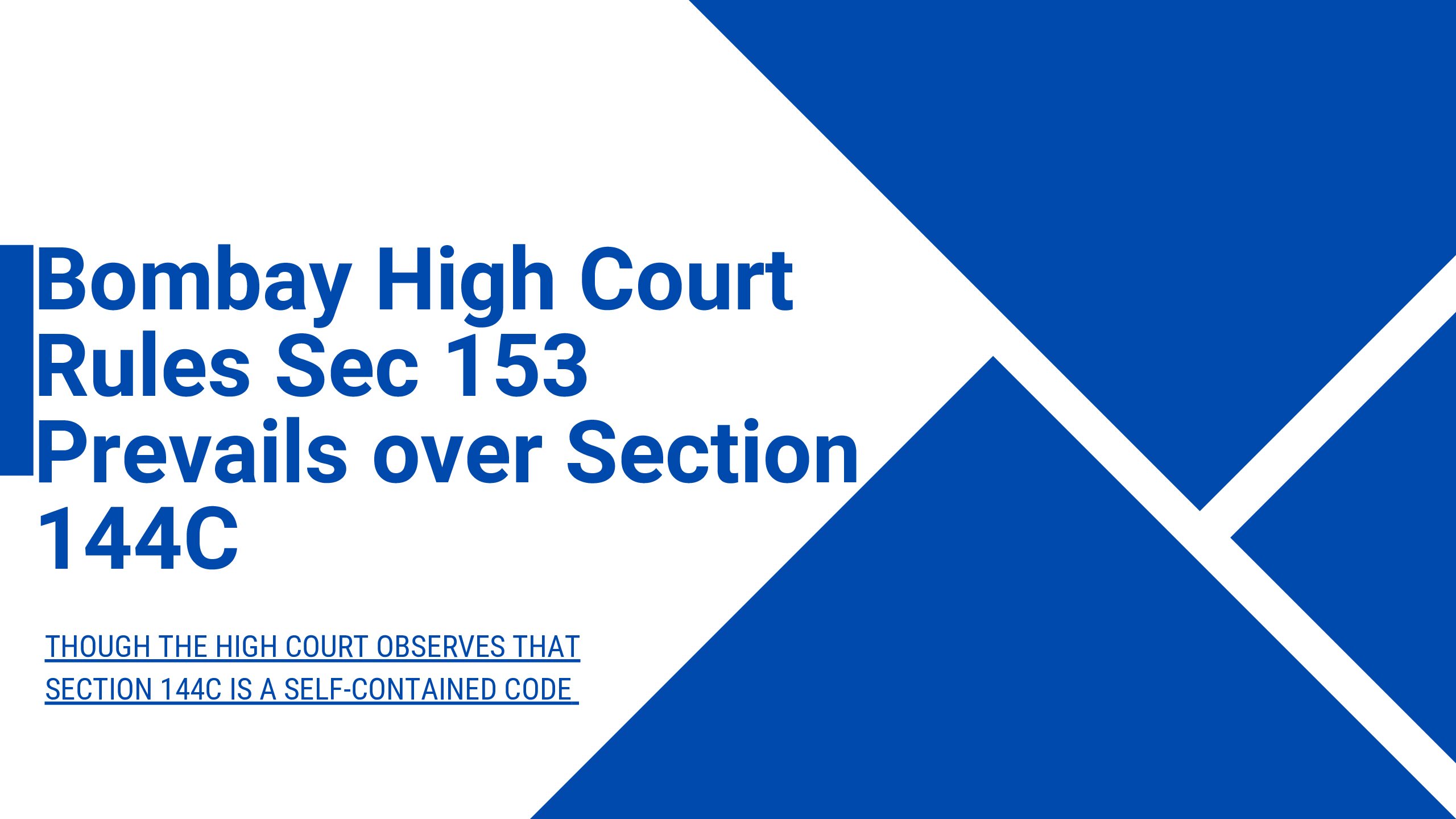In a recent judgment[1], the Bombay High Court clarified that the period of limitation for passing an assessment order will be governed by Section 153, IT Act, 1961 and not by the time period envisaged under Section 144C, even if the latter was a self-contained code.
Introduction
The assessee was a company incorporated in Cayman Islands and headquartered in Dubai. It was engaged in the business of shallow water drilling for clients in the oil and gas industry. The assessee filed regularly filed its income returns under the IT Act, 1961 and the impugned judgment related to the Assessment Year 2004-05.
Arguments
The assessee argued that Section 153, IT Act, 1961 was the outermost limit for passing a final assessment order under the IT Act, 1961. The assessee stated that under Section 153(3), IT Act, 1961 read with Notification No. 10/2021, the time to pass the final assessment order in the impugned case 30 September 2021. While the draft assessment order was issued on 28 September 2021 and the final order was passed in October 2021. In view of the Revenue’s inability to pass the final assessment order before the deadline, the proceedings against the assessee should be held to be barred by limitation.
Revenue, on the other hand, argued that time limit prescribed under Section 153(3) would be in addition to the time prescribed under Section 144C and that the time period prescribed under Section 144C does not get subsumed under Section 153(3). The Revenue made a few additional arguments to support its stance that Section 144C operated independently of Section 153(3). First, the Revenue stated that there was no time limit under Section 144C, the Dispute Resolution Panel (‘DRP’) was required to issue an order within 9 months and the Assessing Officer had one month to pass final assessment based on directions of the DRP. Second, the Revenue argued that Section 144C was a self-contained code and thus acquired primacy over Section 153(3). Third, an extension of the second, the Revenue stated that Section 144C being a special provision should override the general provision, i.e., Section 153(3).
The Revenue also challenged correctness of the Madras High Court’s decision in Roca Bathroom case[2]where Section 153 was held to be the controlling provision for time limit of passing assessment orders. In the said case, the Madras High Court had held that the time limits prescribed under Section 144C and Section 153 are mutually and that the time limits refer not just to draft orders but also to final assessment orders. The Revenue argued that such an interpretation makes a key machinery provision unworkable and would make several orders passed after disposal of objections of DRP untenable.
Decision
The Bombay High Court examined the scheme of Section 144C and noted that Section 144C (13) excluded the application of Section 153. However, the exclusion was specific, i.e., the assessee need not be heard at time of passing of final assessment order and kicked only when the AO had to pass the final assessment order as per the directions of DRP. Otherwise, the High Court observed that the entire proceedings must be completed within the prescribed time provided in Section 153.
The Bombay High Court agreed with the State’s categorization of Section 144C as a self-contained code and that it constituted DRP as an expert body to investigate intricate matters concerning valuation expeditiously. The High Court agreed that while specific timelines have been drawn within the framework of Section 144C to fast-track a special kind of assessment, it ‘cannot be considered to mean that overall time limits prescribed have been given a go by in the process.’ (para 23)
The Bombay High Court further reasoned that where the legislature intended to provide exceptions, they were specifically included and provided in Section 153. It referred to various sub-sections and the Explanation to Section 153 to underline that in certain instances, the limitation period had been extended but that was not the case for Section 144C. In fact, the High Court noted, that if the argument is accepted that the AO is unfettered under Section 144C, it would run counter to the objective of Section 144C wherein time limits have been setup at every step. The High Court observed that ‘it does not stand to reason that proceedings on remand to the AO may be done at leisure sans the imposition of any time limit at all.’ (para 26)
Conclusion
The Bombay High Court rightly concluded that the time limit prescribed under Section 153 will prevail over and above the assessment time limit prescribed under Section 144C. The AO needs to follow the procedure under Section 144C, but the procedure must commence and be concluded within period of 12 months prescribed under Section 153(3). It is an important judgment by the High Court, even though it reiterates the observations made by the Calcutta High Court in the Roca Bathroom case. Especially, it is important to highlight that while the High Court agreed with the categorization of Section 144C as a self-contained code, it did not use that general categorisation to hold that it overrides Section 153 per se, and, in fact, adopted a more nuanced and cogent reading of Section 153.
[1] Shelf Drilling Ron Tappmeyer Limited v Assistant Commissioner of Income Tax, available at https://taxguru.in/wp-content/uploads/2023/08/Shelf-Drilling-Ron-Tappmeyer-Limited-Vs-ACIT-Bombay-High-Court.pdf
[2] Commissioner of Income Tax v Roca Bathroom Products (P) Ltd (2022) 140 taxmann.com 304 (Madras).
